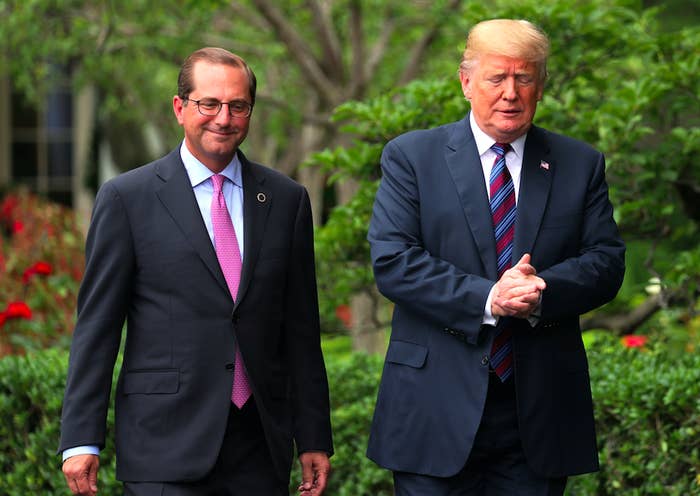
The Trump administration has laid out its vision of the US health insurance system for the foreseeable future — if you can’t beat Obamacare, compete against it.
On Wednesday the administration posted a final rule that, once it comes into effect in 60 days, will allow people to sign up for off-market, unregulated health insurance plans for up to three years.
It’s another major step in the White House’s push set up an insurance system outside of the scope of the Affordable Care Act where plans are cheaper but also provide less coverage and can be denied to people with pre-existing conditions.
The Department of Health and Human Services projects that Wednesday’s action will lead to 600,000 new people signing up for these off-market plans in 2019, rising to 1.4 million over a decade. Over that time it expects enrollment in Obamacare markets to decrease by 600,000.
Analysts warn — and the administration concedes — that this migration away from Obamacare plans will lead to higher premium prices for those who remain in the individual markets. But HHS Secretary Alex Azar told reporters Wednesday that it is necessary to provide an option for people who want cheaper insurance options.
But Azar stressed that this system of two distinct insurance markets is not meant to be a permanent fix. Plan A is still to repeal the Affordable Care Act, something Republicans failed to do last year and have not attempted again since.
“The long-term vision of how the health system should work is we need to repeal and replace the Affordable Care Act, I want to make no mistake about it,” said Azar. “I can’t change that. What I can do is work within the system that, until Congress changes it … I can try to reinvent and transform the system that we have.”
The off-exchange plans, known as “short-term, limited duration plans,” have been around for years. They were originally intended as a way to bridge health insurance for people between jobs. The Obama administration shortened their maximum length from one year to three months, but the Trump White House is now reversing that and allowing the “short-term” plans to be renewed for up to three years.
HHS projects these plans to be on average half as expensive as Obamacare plans, though Azar said in some cases they could be as much as 80% cheaper. However, they are not subject to the regulations of Obamacare. That means they are not federally mandated to cover many services, such as mental health or maternal care or drug costs. They can have high deductibles and payout limits, and people can be rejected for having pre-existing conditions. Essentially, they are similar to the cheap but bare-bones plans that were available before Obamacare was passed.
Azar stressed that coverage gaps and payout limits must be made clear in advance to people purchasing these plans. States will have the ability to regulate them, meaning they could look very different in different parts of the country.
Democratic Sen. Patty Murray denounced the move as further sabotaging Obamacare by allowing insurers to sell “junk plans that skirt patient protections.” Republicans defended it as providing choice to consumers who are unable or unwilling to pay the price for Obamacare plans.
Independent analysts expect prices to rise on the Obamacare markets because many younger and healthier people will opt into cheaper plans, but not enough for the markets to fall into a death spiral.
Poorer people will be insulated from the rising costs by subsidies that are baked into Obamacare. But people who make over 400% of the federal poverty level — about $48,000 for an individual and $100,000 for a family of four — are not eligible for subsidies and bear the brunt of Obamacare price hikes.
“The ACA-regulated market should be sustainable with the stabilizing force of the premium subsidies, but coverage will be more expensive for those not protected by the subsidies,” said Larry Levitt of the Kaiser Family Foundation.
In theory, those people could jump to cheaper, off-market plans. But if they have pre-existing health conditions they could face rejection or higher prices, leaving them with no good option.
Wednesday’s move is in line with other policies since Republicans came up short on repealing Obamacare. The administration repealed the individual mandate, making it possible for people to exit Obamacare markets without facing a tax penalty. It also made it easier for small businesses to form health associations and purchase off-market insurance.
